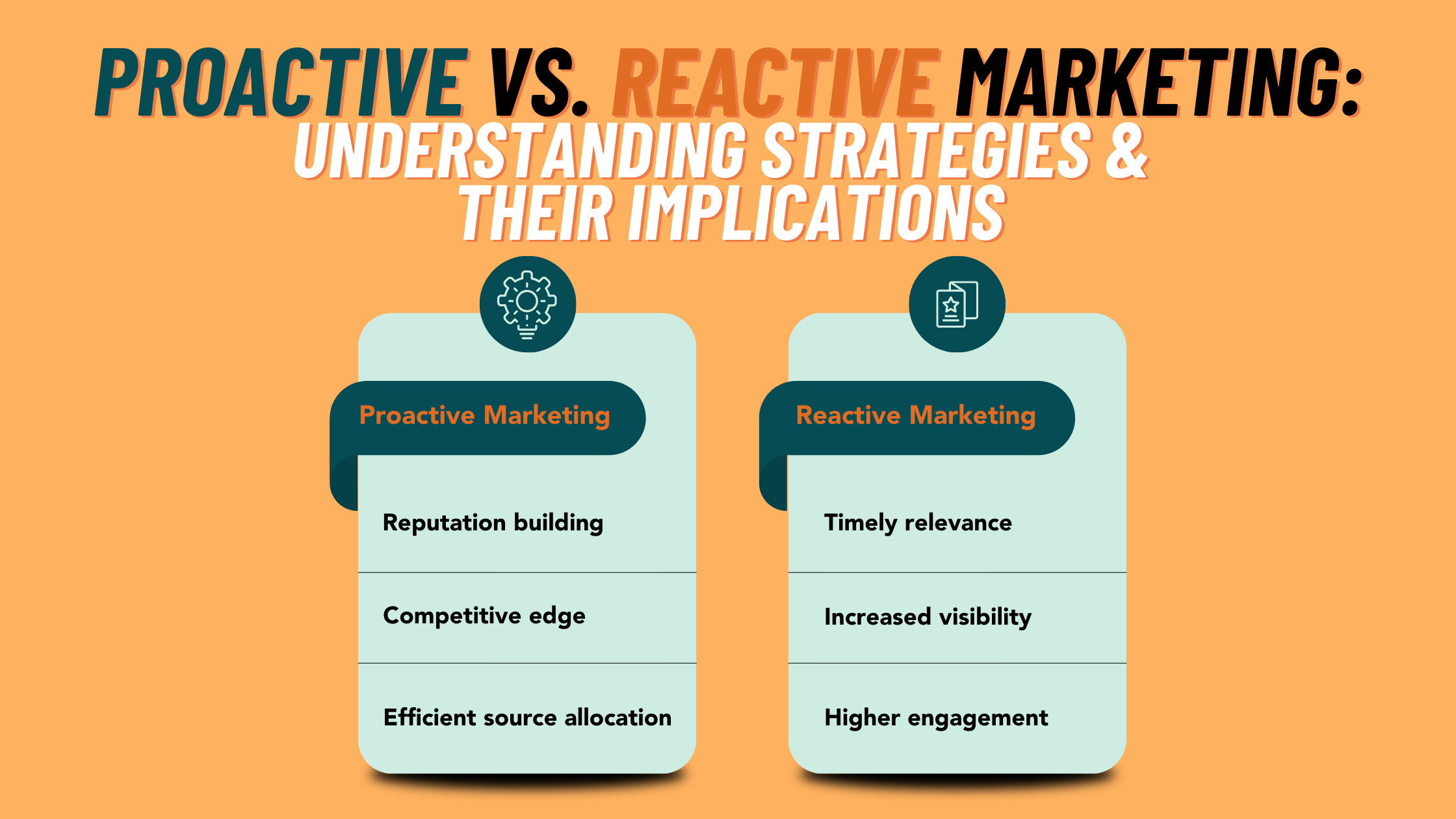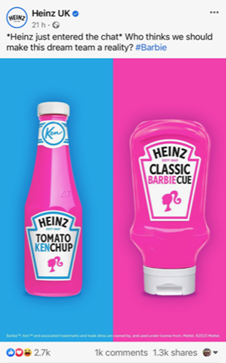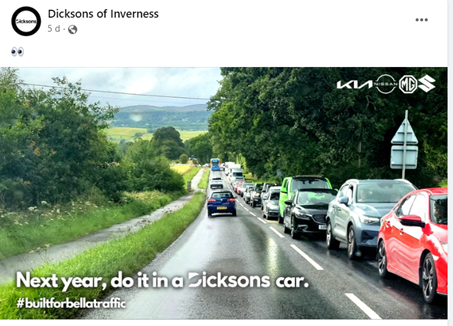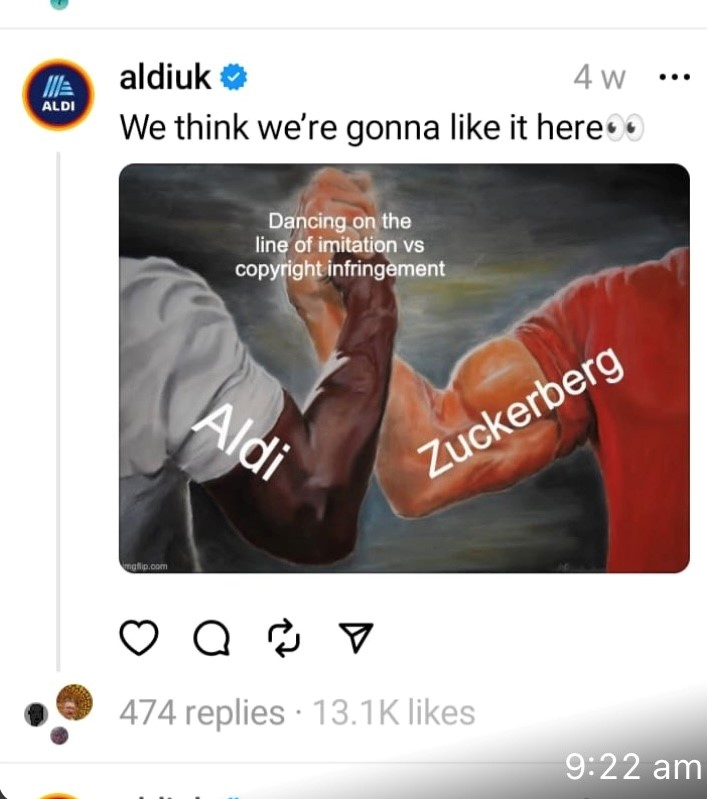
In the ever-evolving world of marketing, businesses must navigate various strategies to stay competitive and relevant. Two primary approaches that companies often adopt are proactive marketing and reactive marketing. Both strategies have their merits and drawbacks, and understanding their nuances can help businesses make informed decisions about their marketing efforts. In this article, we will explore what proactive marketing and reactive marketing entail, discuss their respective benefits and risks, and provide examples of reactive marketing in action.
Proactive Marketing: Taking the Initiative
Proactive marketing is a forward-thinking approach where businesses actively plan and execute marketing strategies in anticipation of future opportunities and challenges. This method involves analysing market trends, understanding customer needs, and creating targeted campaigns to reach and engage potential customers.
What Are the Benefits of Proactive Marketing?
By staying ahead of the curve, proactive marketing allows businesses to gain a competitive edge over their rivals. They can capitalise on emerging trends and be the first to meet customer demands by using data available to them and beating competitors to the chase.
Consistent and well-thought-out proactive marketing efforts help strengthen the brand’s reputation and create a positive image among the target audience. By implementing a marketing strategy, sticking to it, and providing useful or engaging content for potential customers to interact with, businesses can establish themselves as a thought leader and of being reliable within their industry.
With a clear marketing plan in place, businesses can allocate their resources more efficiently, optimising their budgets and efforts towards activities that yield the best results. The strategic blueprint provided by a clear marketing plan acts as a roadmap, guiding the company towards its goals and objectives.
Risks of Proactive Marketing
In the realm of marketing, proactive strategies, characterised by meticulous planning and a clear-cut approach, undoubtedly offer numerous advantages. However, like any venture, they are not exempt from potential risks and drawbacks.
One of the primary uncertainties associated with proactive marketing lies in its uncertain outcomes. Despite the best-laid plans and meticulous preparation, there remains a possibility that initiatives may not deliver the desired results. This is often attributed to unpredictable shifts in the market landscape or changes in customer behaviour, which can throw even the most well-crafted campaigns off course.
Another aspect that businesses must reckon with when employing proactive marketing is the significant upfront investment it demands. Research, campaigns, and product development all require a substantial financial commitment, which can pose challenges for some enterprises, especially smaller ones. The potential for substantial costs can make proactive marketing a risky proposition for those operating on tighter budgets.
While proactive marketing undoubtedly has its merits, businesses need to weigh these potential pitfalls against the anticipated benefits. Striking a balance between proactive and reactive marketing strategies can help companies navigate the complexities of the ever-changing business landscape more effectively. Working with a professional agency can help ease these concerns and provide you with more time to focus on the day-to-day running of your business.
Reactive Marketing: Responding to Current Events
Reactive marketing, on the other hand, involves responding to current events or trends that capture public attention. This strategy capitalises on the moment, utilising unplanned opportunities to create marketing campaigns. Reactive marketing can be particularly useful in the age of social media, where trends or memes can quickly go viral and offer companies a chance to gain immediate exposure.
What Are the Benefits of Reactive Marketing?
Reactive marketing offers businesses several benefits, leveraging the power of timely responses to current events and trends. By swiftly reacting to trending topics, companies can portray themselves as up-to-date and in tune with their audience’s interests. Such responsiveness resonates with audiences who are actively engaging with the discussed subjects, enhancing the brand’s appeal and connection with potential customers.
Another significant benefit of reactive marketing is the potential for increased visibility. When executed skilfully, reactive marketing campaigns can generate substantial media coverage and social media engagement. By capitalising on viral trends or popular events, businesses can grab the attention of a broader audience, significantly boosting brand exposure and widening their reach.
Risks of Reactive Marketing
As with any marketing approach, reactive marketing carries its share of risks. One of the primary concerns lies in maintaining brand consistency. The fast-paced nature of reactive marketing demands quick decision-making, which can potentially lead to rushed messaging that deviates from the brand’s established identity. Inconsistency in messaging can confuse customers and dilute the brand’s core values, eroding the trust built over time.
Moreover, there are reputation risks associated with reactive marketing. When companies chase trends without thoroughly considering their implications, they risk coming across as insensitive or misinformed. Ill-judged reactions to sensitive topics or events can cause controversies, damaging the brand’s reputation and alienating its customer base. Therefore, careful consideration and sensitivity are essential when engaging in reactive marketing initiatives.
Examples of Reactive Marketing
Reactive marketing often involves creating content or campaigns based on popular events, memes, or news stories. Here are some examples of our favourite executions by brands online:

Lastly, Dicksons of Inverness delivered a brilliant example of reactive marketing. When traffic heading to the Belladrum music festival reached a standstill, with guests enduring up to five hours of wait time to move a few miles to the festival site, Dicksons seized the moment to create a tongue-in-cheek advertisement. They humorously suggested that next time, people should make the long wait in one of their cars. This witty response not only entertained the audience but also showcased Dicksons’ ability to be responsive and relevant to current events.

Heinz, for instance, demonstrated their prowess in reactive marketing by cleverly riding the wave of Barbie memes that became popular due to the blockbuster film this summer. They took advantage of the trend and showcased two of their beloved condiments in a cheeky way that perfectly aligned with the Barbie franchise.
Aldi, known for poking fun at themselves, seized an opportunity to playfully target Meta’s founder, Mark Zuckerberg, on the new social media platform Threads. Given Aldi’s history of products that border on copyright infringement, such as their Colin the Caterpillar knock-off, the jibe at Zuckerberg was both timely and relevant. The recent criticism directed at Zuckerberg following the introduction of Threads, which closely resembled Twitter (now known as X), made the post even more impactful.

Reactive marketing is undoubtedly an effective way for brands to connect with their audience, and these examples demonstrate how it can be used to capture attention and create engaging content that resonates with consumers.
Embracing Proactive AND Reactive Marketing
Proactive and reactive marketing are two distinct approaches, each with its own set of advantages and risks. Proactive marketing allows businesses to stay ahead of the competition, build their brand, and allocate resources effectively. On the other hand, reactive marketing provides opportunities for immediate relevance and visibility, capitalising on timely events and trends. Striking a balance between these strategies can be advantageous, as a well-rounded marketing approach considers both planned initiatives and timely responses to the ever-changing marketing landscape.
Looking for advice when it comes to your marketing strategy? At teclan, we adopt innovative approaches to ensure your brand is not only relevant but also on-trend. Let us help you navigate the complexities of the digital world and elevate your marketing efforts to new heights. Contact us today to discover how teclan can transform your brand’s online presence and drive impressive results.


